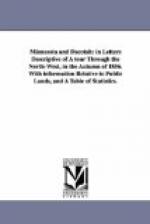[1 Since this letter was written, Mr. Thomas Cathcart has purchased a valuable claim opposite Crow Wing at the mouth of the river, which I should think was an available town site.]
My observation and experience in regard to town sites have taught me an important fact: that as much depends on the public spirit, unity of action, and zeal of the early proprietors, as upon the locality itself. The one is useless without these helps. General Washington wrote an able essay to prove the availability of Norfolk, Va., as the great commercial metropolis of the country. He speculated upon its being the great market for the West. His imagination pictured out some such place as New York now is, as its future. The unequalled harbor of Norfolk, and the resources of the country all around it, extending as far, almost, as thought could reach, might well have encouraged the theory of Washington. But munificence and energy and labor have built up many cities since then, which had not half the natural advantages of Norfolk, while Norfolk is far behind. A little lack of enterprise, a little lack of harmony and liberality, may, in the early days of a town, divert business and improvements from a good location, till in a short time an unheard-of and inferior place totally eclipses it. Knowing this to be the case, I have been careful in my previous letters not to give too much importance to many of the town sites which have been commended to me along my journey. I do not discover any of these retarding circumstances about Crow Wing. I must conclude at this paragraph, however, in order to take a horseback ride to the Chippewa agency. In my next I intend to say something about the Indians, pine timber, and the country above here in general.
LETTER VII.
Chippewa Indians.— Hole-in-the-day.
Description of the Chippewa tribes— Their habits and customs— Mission at Gull Late— Progress in farming— Visit to Hole-in-the-day— His enlightened character— Reflections on Indian character, and the practicability of their civilization— Their education— Mr. Manypenny’s exertions.
Crow Wing, October, 1856.
I consider myself exceedingly fortunate in having had a good opportunity for observing the condition of the Chippewa Indians. Sometime ago I saw enough of the Indians in another part of the country to gratify my curiosity as to their appearance and habits; and as I have always felt a peculiar interest in their destiny, my present observations have been with a view to derive information as to the best means for their improvement. The whole number of Chippewas in Minnesota is not much over 2200. They are divided into several bands, each band being located a considerable distance from the other. The Mississippi band live on their reservation, which begins a few miles above here across the river, while the Pillagor




